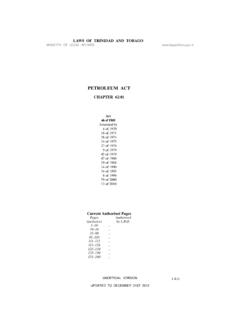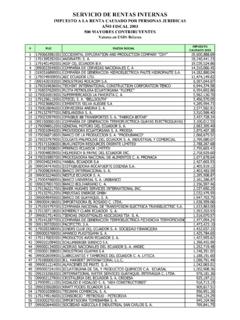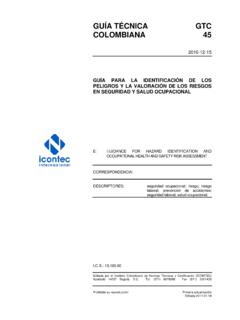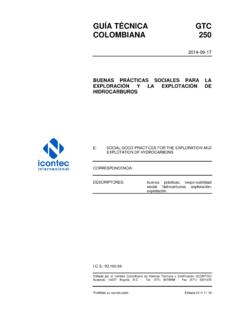Transcription of Government of the Republic of Trinidad and Tobago …
1 Government of the Republic of Trinidad and Tobago MINISTRY OF ENERGY AND ENERGY INDUSTRIES. SPEECH. SENATOR THE HONOURABLE FRANKLIN KHAN. MINISTER OF ENERGY AND ENERGY INDUSTRIES. ENERGY SPOTLIGHT. OUR OIL, OUR GAS, OUR FUTURE. HYATT REGENCY, PORT OF SPAIN. March 14, 2018. Introduction Good morning, this is the first public account of the energy sector of Trinidad and Tobago (T&T). It comes on the heels of our successful spotlight presented on the economy which was a pre-budget presentation. In keeping with the theme, Our Oil, Our Gas, Our Future, my address will cover the state of the industry, the challenges and the future from a Government perspective. The presenters who will follow are, Permanent Secretary, Ministry of Energy and Energy Industries, Mr Selwyn Lashley, Permanent Secretary, Ministry of Finance, Mr Vishnu Dhanpaul, Mr Tony Paul, Chairman, Local Content Committee, and Mr Graham Hartnell and Mr Graeme Wildgoose of Poten and Partners will provide a more in-depth account of specific areas within their purview and area of expertise.
2 The ultimate objective is to provide to you the people of (T&T), the resource owner an account of the stewardship of the sector and the plans for the future. The underlying theme of the presentations is that T&T continues to be an important and viable oil and gas province. This is evidenced by our upstream stakeholders who, as in the case of BPTT and Shell, are among the top five (5) oil and gas producing companies in the world. Other companies such as BHP, EOG Resources and Perenco are highly regarded in the industry. When this administration took office in September 2015 the industry was saddled with a number of challenges and uncertainties. There was declining production, low levels of investment, outstanding contract negotiations to be concluded for the 2. supply of gas with both upstream and downstream companies and major claims on the NGC. As a responsible Government , we took immediate steps to address these issues by effecting the following: The reactivation of the Cabinet Standing Committee on Energy, chaired by the Honourable Prime Minister Established as a Sub-Committee of the SCE-The Energy Task Force which is headed by former Minister of Finance, Mr Wendell Mottley.
3 Receipt of the Poten and Partners Gas Master Plan Report in September 2015. Appointed the Lashley Committee on the Restructuring of Petrotrin in February 2017. Brokering by the Honourable Prime Minister of firm gas supply commitments from upstream producers BPTT and EOG at the Houston Meeting in April 2017. Issued a mandate to the restructured Petrotrin Board of Directors to return the company to viability pursuant to the Lashley Report submitted on June 3, 2017. Laid the Gas Master Plan Report in Parliament. Continuous action by NGC to settle outstanding downstream claims. Re-establishment of the Permanent Petroleum Pricing Committee. 3. Upstream Activity Let me start with the good news. The upstream companies have committed to spend over US$10Bn in exploration and development activities over the next five (5) years. The positive effect of such investment is already being realized. In December 2017, natural gas production which had fallen to per day reached a daily production of the highest since 2011.
4 Given the investment commitment by the upstream the gas shortage or curtailment that has been a negative feature of the industry operations for the last seven (7) years will be now be minimized if not eliminated. These investments include the BP Angelin project which is due to come on-stream in the first quarter 2019 and will provide in excess of 550 Mmscf/d, the De Novo project which is due to come on-stream by first quarter 2019 with 60 Mmscf/d. Other imminent projects are the East Coast and North East Coast Development projects of Shell, such are Starfish, Dolphin, Dolphin Deep, Endeavour and Bounty Fields on the East Coast and the Cassra and Orchid on the North East Coast. There will be a phased development of these fields over 2018 to 2019 with first gas coming from the Starfish in the Second Quarter of 2018. EOG Resources have also indicated its intent to pursue over the period 2018 to 2022 exploration and development activity in its SECC block and with BPTT in the deep horizons of the Teak, Samaan and Poui Block.
5 BHP will be pursuing development activity in its Block 3a. 4. There are also proven gas fields such as the Venezuelan Dragon Field and the cross- border fields with Venezuela, the Loran-Manatee, the Kapok-Dorado and Manakin- Cocuina for which development plans are currently being worked on and from which gas will be available in the next two to three years. The picture would not be complete without mention of recent gas finds of approximately seven (7) TCF. BPTT recently announced the discovery of two (2) TCF of natural gas in the Savannah and Macadamia fields in its acreage in the South East Coast Area of Trinidad . These discoveries put to rest any lingering doubts on the continued prospectivity of the shallow and near shore areas, which have been the location of past major discoveries. New technological innovations such as the Ocean Bottom Cable survey has given a new lease of life on these areas and have confirmed the assertions by eminent geologists both locally and internationally that significant quantities of oil and gas are yet to be found.
6 BHP also announced a natural gas discovery in Block 5 in our deep-water area on the East Coast. Preliminary indications are that the find ranges between five to ten Tcf and there is also evidence that the block possesses oil. In the coming months exploration activity will be conducted by BHP in blocks 5, 14 and 29 in our deepwater area. In 2018, nine (9) exploration wells are to be drilled and these include three (3) deep-water wells. In a regional context, the Caribbean Region has become the focus of oil and gas companies in their quest for new hydrocarbon resources. Success in exploration in the deepwater areas of Guyana has stimulated interest in other Caribbean 5. Countries. There are currently exploration activity being conducted in Suriname, Cuba, Barbados, Grenada and Guyana. This provides opportunities for T&T in all aspects of the oil and gas value chains. I intend to lead the charge in a new Caribbean Energy Diplomacy in the coming months.
7 Our Oil and Gas Resources Exploration activity is a costly and risky business. The cost of drilling an exploration well in deep-water runs into the tens of US million dollars and development cost are in US billion dollars. Therefore, energy companies expect to realize a fair rate of return on their investment and rightly so. Concomitantly, the resource owner, the people of T&T expect to receive a premium for the monetization of its non- renewable oil and gas resources. Indeed, I will go further and state unequivocally that the State, as the resource owner, has a sovereign right to extract a fair economic rent on behalf of the people of T&T. Our 3P gas reserves based on the last Scott Reserves audit were and gas resources were estimated at The audit information does not include the gas finds of the BHP discovery in its deep-water Block 5 which is an estimated five TCF or the BP Savannah and Macadamia fields of two (2) TCF. Our gas reserves are consumed at the rate currently estimated at or to TCF per annum.
8 The current gas utilization of is apportioned between LNG (60%) and the downstream industries including power generation (40%). Between 2018 and 2019. most of the gas contracts between NGC, the aggregator of gas for the downstream industries and the upstream companies expired and likewise the petrochemical 6. companies. Yet it was only when a new Board at the NGC was appointed by this Government that negotiations for new gas contracts commenced with the upstream companies. This dereliction of its responsibility by the former NGC Board and by extension the then Government , put the future of the petrochemical industry at risk, and also placed this Government , in a disadvantageous negotiating position. The situation required the intervention of the Honourable Prime Minister, who in April 2017 met with senior executives of BPTT and EOG Resources at the famous Houston meeting at which gas supply issues were resolved. Discussions with Shell are ongoing and a favourable outcome is expected.
9 Gas supply arrangements are already in place with BHP. Economic Rents Data from the Ministry of Energy and Energy Industries (MEEI) and the Ministry of Finance (MOF) reveal that taxes and royalties collected from the sector have been on a diminishing trend. Energy sector revenue which peaked at TT$28Bn in 2008. fell to TT$ in 2017. Falling energy prices may account in part for the reduction in revenue. Oil prices which averaged US$97 per barrel in 2008 averaged US$54 per barrel in 2017. Henry Hub gas prices on which most contracts are based fell from US$9 per MMBtu to US$ per MMBtu. The fall in energy prices and declining production, as significant as they were could not be solely responsible for precipitous fall in revenue. A survey of other oil and gas producing countries was undertaken to ascertain whether our experience was 7. shared. This was not case. The research indicated that we are singular in this matter. In one example, whereas the upstream company in that other jurisdiction paid taxes of US$ or 53% on its gross revenue of US$ that said company paid only US$31M or in taxes from its gross revenue of US$ in T&T.
10 A. comparative analysis of the T&T competitiveness showed that T&T is in the median range with respect to fiscal incentives and the rate of return achieved by investors was among the highest in oil and gas economies. Also, of immense concern is the fact that while the Minister of Finance is challenged by revenue collections, upstream companies holding substantial assets in T&T are reporting record profits. State owned Petrotrin is also complicit in the under-payment of revenue due to Government . Petrotrin which produces approximately 60% of the country's crude oil has been withholding payment due to its financial challenges and other financial obligations. As at December 31, 2017, the company owed Government TT$ in taxes and royalties. With current prices averaging US$60 per barrel the debt continues to accrue at TT$70M per month without any indication by Petrotrin of any forthcoming payment. Obviously, this is an unacceptable position which the Board of Directors has been requested to address.











